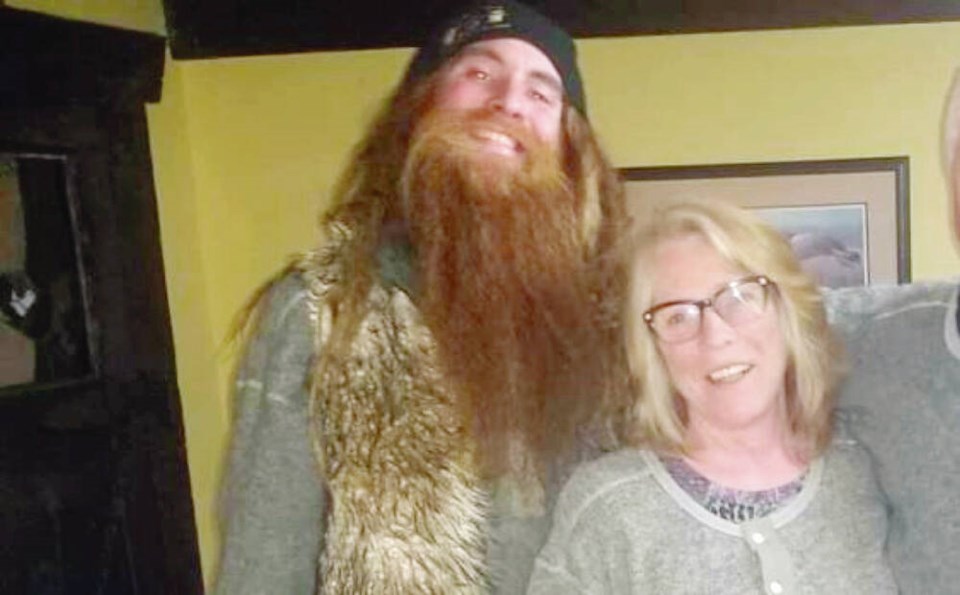Physical evidence at the scene of a fatal shooting three years ago proves a Port Alberni woman deliberately killed her son, the Crown said Tuesday during final submissions at Samantha Dittmer’s trial for second-degree murder.
Crown prosecutor Gordon Baines told members of the jury they should have no difficulty in finding that Dittmer deliberately shot her son, Jesse McPhee, point-blank in the chest with a rifle on Aug. 29, 2021.
“The bloodstain pattern analysis is key evidence in understanding the truth of this case. … In fact, the bloodstain pattern analysis proves that the shooting of Mr. McPhee was deliberate,” he said.
Forensic pathologist Dr. Elizabeth Brooks-Lim testified that the muzzle of the gun was pressed into McPhee’s chest, said Baines. The length of that muzzle, from rifle to trigger, was 70.5 centimetres.
“So we know that Miss Dittmer had to have been standing at least that close holding the rifle,” said Baines.
A bloodstain on the upper kitchen cabinet was a forward projection stain, meaning the blood was moving horizontally when it was deposited, said Baines. This means that McPhee, who was five-foot, seven-inches tall, was standing at almost full height when he was shot.
The entrance wound was four-feet, six inches from the bottom of McPhee’s feet. Dittmer is five-foot, three-inches tall.
“This means the muzzle of the rifle was [eight inches] lower than the top of Miss Dittmer’s head,” said Baines. “The rifle would have been held shoulder-height at a slightly upwards angle. That would have put the butt of the rifle about her shoulder.”
McPhee’s girlfriend, Brandy Kazakoff, testified for the Crown that she did not hear any conversation or argument before she heard the gunshot. She concluded that Dittmer had sneaked up on McPhee.
“She was correct,” said Baines. “In her own testimony, Miss Dittmer confirmed that she did not alert Mr. McPhee that she was coming downstairs. She walked in the open doorway without announcing herself and didn’t say one word to him before he was shot.”
In addition, a firearms expert testified that the only way the rifle could have fired was if the safety was off and the trigger pulled, Baines told the jury.
Considering all the evidence, there’s only one reasonable conclusion, he said. Dittmer knelt down and retrieved the rifle from under her bed, opened the bolt and loaded it. She left the safety off, walked downstairs and entered McPhee’s suite without announcing herself.
“Without saying one word, she shouldered the rifle and pushed the rifle into his chest. She pulled the trigger. Death was the only foreseeable result,” said Baines.
Dittmer left the suite without trying to administer first aid to her son, he noted. She did not tell Kazakoff it was an accident. She didn’t tell the 911 operator that McPhee had been shot by accident.
“You may ask yourself how a parent could kill their own child. It seems unbelievable. … The sad truth is sometimes parents murder their children,” said Baines.
The jury has heard about the extreme stress Dittmer was under leading up to the murder.
“Everyone has their breaking point,” Baines said.
In his final submission, however, defence lawyer Brian Coleman called McPhee’s death a tragic accident, saying the Crown “failed to prove Miss Dittmer is guilty of anything.”
“She has the presumption of innocence. She sits before you, innocent.”
McPhee was a troubled individual with a number of mental-health issues who was drinking a lot and subject to mood swings, said Coleman. At the time of his death, McPhee had two and a half times the legal limit of alcohol in his blood.
Dittmer was bearing the brunt of McPhee’s legal problems, but she loved her son and was protective and caring of him. The Crown suggestion that Dittmer had reached her breaking point and decided to kill McPhee is absurd, said Coleman.“It goes way too far. There’s no way in the world the solution to the problems was to kill her son.”
The defence lawyer reminded jurors of the testimony of a neighbour who said McPhee came into his backyard, barefoot and covered in blood, asking him if he wanted steak for breakfast. The neighbour found the situation odd and disturbing, said Coleman.
Kazakoff was a biased witness and her testimony that Dittmer killed her son is a classic case of circumstantial evidence, said Coleman.
Kazakoff heard a bang and ran into the kitchen to see Dittmer holding a gun, he said.
“She did not hear the gun going off. She came to the wrong conclusion that Miss Dittmer had shot her son. But the gun went off solely because of the inexplicable actions of Mr. McPhee,” said Coleman.
Dittmer picked up the gun, believing it was unloaded. She walked downstairs carefully, never touching the trigger, intending to return the gun, he said.
“She never anticipated that he would attack her or lunge at her and then … the gun went off. But not even as a result of anything she did.”
The jury will return to court this afternoon to receive instructions from the judge that summarize the case and explain the law.



